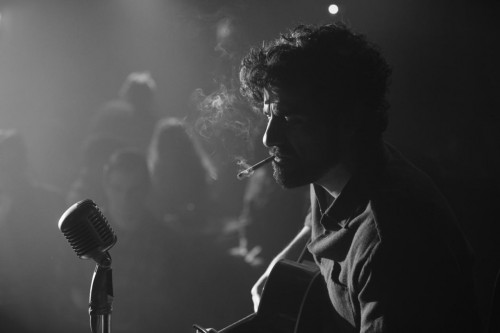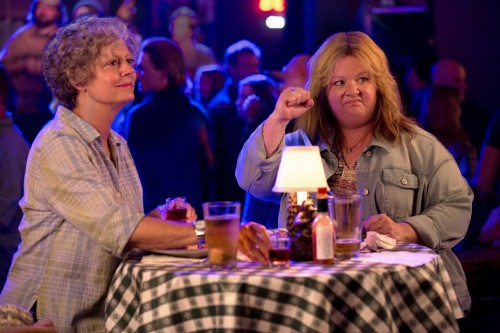By Greg Popil
The movie starts, after a brief title card explaining that we are in Greenwich Village in 1961 on a stark shot of an old-fashioned microphone in a black background. The anticipation of a song hovers in the air. Finally, the handsome, bearded protagonist leans in, strums his guitar and begins to sing. He is played by Oscar Isaac, a journeyman actor with a vaguely familiar face and a fantastic voice. The club, which we will eventually learn is the Gaslight, is lit like a church, natural sunlight pouring through the windows like a series of spotlights. The audience is appreciative and rapt. It is only as the song progresses that we begin to understand the punch line: the song itself is not terribly good.
“Inside Llewyn Davis” is not a movie about how music will save your disappointing life. It is not a movie where the dark, lonely path of a singer allows him to yield something beautiful and transcendent. And it certainly is not a movie in which a miserable, pompous ass hides a heart of gold. Davis is not an awful person, and it isn’t hard to root for him to eventually turn his life around, but the hell that he occupies appears to be largely of his own creation.
None of this should come as any surprise to anyone familiar with the Coen Brothers’ work. Aside from the eternally radiant ray of sunshine known as Marge Gunderson, you’d be hard-pressed to come up with a single person in their entire collection of films that could genuinely be described as “good” (and yes, that includes your precious Dude). The Coens have long trafficked in the lowest of the low, taking criminals and cads and dragging them through their surreal, brutal hellscapes, seemingly for their own amusement and virtually no regard for audience expectation. One could easily imagine the two of them lying one day under a single headstone etched with the line from “A Serious Man’s” rabbi: “God doesn’t owe us an answer. The obligation runs the other way.”
Davis acts as our de facto guide around the early ’60s Village, an idealized moment in time that the Coens have chosen to make look as bleak and uninviting as humanly possible. It can be easy to miss regular Coen cinematographer Roger Deakins and his epic, capital-C Cinematic camera work, but it was the right choice here to film in as naturalistic a manner as possible. The first half of the movie might be the most naturalistic thing they have ever filmed, yet another stylistic departure in a career filled with them (their next movie is scheduled to be an historic epic about Napoleon, because of course it is).
We encounter Davis’ ever-shrinking circle of friends, whom he is completely willing to use for a place to crash when he isn’t too busy insulting and berating them (one extreme example of this is explained later, but it doesn’t make the effect any less shocking). Predominant among this is Jean, played by Carrey Mulligan with an acidic nature that seems unduly harsh (her predicament really isn’t entirely his fault) until you realize the lengths to which Davis has gone to use both her and her boyfriend/singing partner Jim (a nicely understated Justin Timberlake). Llewyn and Jim’s recording of a proto-protest song is the movie’s comedic highlight, but even that scene is a little sad when you see the depths of Davis’ desperation, and that a friend who he has betrayed beyond all measure is still trying to help him.
It isn’t until the second act, a road trip involving a drug-addled jazz artist (John Goodman, who seems all too delighted to be returning to the Coens’ fold after a 13-year absence) and his valet (an awesome Garrett Hedlund) that the movie sidesteps into the sort of surrealism that the Coens favor; half-told stories and blurry taillights lead down a dream-like tunnel that could lead to the meaning of everything or absolutely nothing.
And all throughout is the music. T-Bone Burnett, who won a well-deserved Oscar for writing songs that sounded like they could easy be country hits for “Crazy Heart,” pulls off a much more difficult and impressive task here, creating perfectly serviceable folk music that doesn’t sound quite good enough to truly break through. It seems almost cruel that the Coens, filmmaking prodigies who in recent years have had their genius recognized by the Academy and audiences at large, would be so good at writing an ode to the not-quite-good enough, in which they unflinchingly shine a mirror back on their characters culpability in their own mediocrity.
Heaven is in sight, but unattainable, like the bright lights of Akron, Ohio. Purgatory is wrapping the same story around, doomed to never escape to the sea or fame and fortune. But at least, if you try, you might learn how to handle a feisty cat.
Rating: 79/81




Leave a Reply